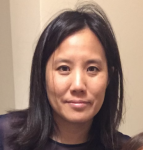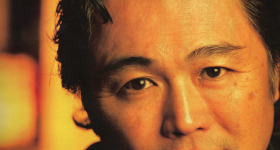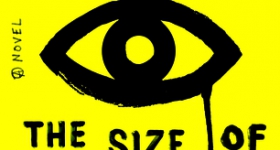After I read Gish Jen’s Thank You, Mr. Nixon, I had a self-indulgent, sentimental moment. This book was written for me, or maybe it’s a letter to me. Finally! A book for me! After the initial excitement and ugly cry (due to the last story, “Detective Dog”), I calmed down and realized that, in actuality, the book is for anyone who is interested in the geopolitical consequences of the China-America dynamic. And since Asian Americans are now a fast-growing population in America, there is now a substantial audience for this book who can relate intimately with the subject matter. At the end of a memorable 2021, I was able to Zoom with Jen about her book and its importance in this current geopolitical climate.
Jen’s book chronicles — most often from the distance of towns and cities in America — how the formerly closed China reopened. Her first story is written in the form of a letter from a Chinese girl to President Nixon after his visit in 1972, which signaled the opening of China; it is worth mentioning how dramatic this opening was. Prior to Nixon’s visit, China was clamshell-closed: No one there could even send a fax to another country. Looking back, the closure of China to the world was a profoundly emotional response on the part of the Chinese government, who felt their country had been pillaged by other countries — the concessions of Shanghai and the rape of Nanjing are two painful examples that caused the nation deep resentment and shame, a “century of humiliation.” It is both incredible and deeply heartbreaking that a country would close itself so thoroughly to other nations.
The opening of China beginning in the 1970s changed so much for family, friends, educational institutions, business opportunities all over the world. In my experience, I reunited with family that we hadn’t seen for 40 years. China’s coming alive again to the West was like a big part of the planet suddenly becoming available culturally, socially and economically. Jen’s stories relate how reopening affected social dynamics in America. When I was reading Thank You, Mr. Nixon, each story — except the first one, which is a letter to President Nixon from a Chinese girl — felt like a story about experiences I had shared.
In “It’s the Great Wall!” the beginning of tourism is on ample display in that a family takes their grandmother back to China. In this story, the Chinese guide’s inconsistent English requires grandma to step up and become the trip interpreter — not only linguistically but culturally. As I read this story I thought, My grandmother climbed the great wall at 75 years old because she was so happy to be able to return.
In “Gratitude,” wealthy Hong Kong parents bid on their estranged daughter’s New York apartment so they can see finally see her at the closing. And here I thought, that sounds like a cousin of mine who found her success in textiles in Hong Kong.
In “Mr. Crime and Punishment and War and Peace,” Chinese law students encounter mansplaining at an American law school. I have relatives who came over for graduate school. The book is revelatory about how profound cultural difference can influence human behavior and interaction. Also, Jen is extremely self-aware of her positioning to the stories. She calls herself “an intimate outsider” who might see things about a culture precisely because she is on the outside — things that insiders would miss. Gish Jen’s early fiction was not about China at all. When I talked to her at the end of 2021, she related how in the beginning of her career, she was focused on what it means to be American. Her family immigrated in the 1940s, well before the 1960s wave. Chinese Americans in her community were a small minority. For Jen, this meant that their status as Americans was regularly contested. “So obviously that was the subject that interested me,” said Jen. “I was not so interested in writing about China and also, I had never even been to China! What did I know about China?”
While she was urged by people around her to write about China, she rebelled against the idea. It wasn’t until the late 1970s that Jen felt adequately informed to publish observations of China, as she commenced with a pattern of regular visits to the country every three years or so. The visits were consistent but not deliberate: “I wasn’t like one of those photographers who plan to take a picture of themselves in front of the same door every year,” she said. She would visit China, return to the United States and later return to visit other areas she had not seen. “I began to realize I actually knew something about China. I knew something about what it meant to be Chinese American but also something about China, just from having gone so much, in the same way I know some things about being American.” In line with this, Jen says that from writing Mona in the Promised Land (1996), she learned a lot about being Jewish. It was because of her outsider status that she could capture her cultural milieu.
In Thank You, Mr. Nixon, her comedic voice helps to bridge the gaps between China and America. For example, in one of her stories she begins:
Duncan Hsu, foreign expert. That was his name in China. In America, it had been Duncan Hsu, dropout. He had dropped out of a military academy, a med school, a computer programming night class, a soap opera of a relationship and even, recently, out of a career-exploration minicourse.
Jen clearly has a flair for comedy and adds that even in her sleep she’s funny. In fact, she suspects that funniness might be genetic even though society is a long way from determining which gene is the one for humor. That humor is a mix of insight, energy and articulate voice, all of which Jen illustrates. She opens the story “Gratitude” with this observation:
For what did one raise these children? For what did one labor and heave and suffer reconstructive surgery; for what did one feed and clothe and coax and school, raising them from sitting to standing to making their own money, if not for their well-deserved gratitude? It was work, it was a lot of work, even with Filipino maids and international school and pull at certain American universities.
Before writing these fictional characters, who seem like avatars from both Chinese and American cultures, Jen finished a book on contrasting East and West in The Girl at the Baggage Claim (2017). By that time, she had been to China multiple times and had met Chinese people from all walks of life. Thank You, Mr. Nixon emerged from short stories she wrote about historical Chinese phenomena from the 1970s to the present: “I never had the intention of writing a book but every five years or so I’d write a story and when I looked at them, I thought, oh, there’s a book here, that they’d been written chronologically.” She recounts that China’s opening up was followed successively by more exchange between China and America: Chinese started buying property in New York and attending American universities.
Jen’s explorations of China and Chinese culture stimulate a reflection on American society. Americans who view China as a pit of human rights abuses, for example, might be enlightened by the alternative interpretations of behavior that Jen offers. In one of her stories, she writes about the recent phenomenon of forgery that was taking place in the United States. American journalists recounted how immigrant Chinese artists were copying — to startling perfection — major Western artists from past and present and selling such works to major galleries. In line with this, one of Jen’s stories centers around a forger who precisely follows the techniques to create Mark Rothko paintings. As Jen writes it, for the forger, the act of forging pays homage to the artists s/he copies. Even with the Apple products that Chinese have been copying, Jen says, “It’s not self-conscious. It’s definitely just homage. They mean no harm. They are just full of admiration. And if we stop and think about it, it’s the kind of admiration we have a hard time accessing. You have to rebuild one of these systems yourself to realize just how amazing it is. Their appreciation is very deep.”
Jen has insights on topics from forgery, individualism and the attack on the Capitol and what it meant for American individualism. She noted that there were good and bad flavors of American individualism, the good one being the flowering of the human spirit and the other kind a toxic mix of narcissism and selfishness. The notion of individualism is often set up as a contrast to Chinese collectivity. As Jen observes, China has still in some ways, a gift economy. She adds that the Chinese don’t need to be paid for everything, get credit for everything, be thanked for everything.
The Chinese still resist the market economy which largely characterizes Chinese society now. In comparison, Jen says, America has a solid market economy that exists at a huge cost: “We have a very competitive society where everyone is very insecure, and that can blow up at any time.” Conversely, she says that in China, it’s basically all family. “If we’re all family like in China, we can say whatever we want. Whatever comes into their head can come right out of their mouth.” While America has a lot of boundaries, China’s system is still one where people depend on each other to make it to the end of their lives so that their boundaries are softer. Jen recounts with a sigh: “In America it’s IRAs, retirement, essentially an entirely different system.” While these fundamentals are true, the effects on how people treat each other are most aptly captured by Jen’s writing insights, and for those, we can thank her deeply.










Comments